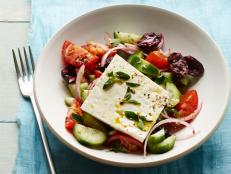The Mediterranean Diet Can Be Beneficial During Pregnancy, Study Finds
For those who are or may become pregnant, the Mediterranean diet offers a food philosophy that brings unique benefits during this special time, according to research.

ebe7/Getty Images
Pregnancy is a time of exciting change, which may include your eating habits. While there is a plethora of information online, there is often a lot of confusion around fertility and pregnancy nutrition. Often, pregnant people are provided with a simple one page note during their initial prenatal visit on foods to avoid during pregnancy, with very little or no guidance on what foods to eat. Top that off with pregnancy challenges such as nausea, food aversions, gastric reflux, gestational diabetes or concerns on pregnancy weight gain and it can start to feel like a real challenge knowing how to nourish your body and growing baby. Preconception and pregnancy are an important time where nutrition can play a significant role in the health of the mother and baby, and research shows the Mediterranean diet can provide many benefits during this time.
The Benefits of Following a Mediterranean Diet During Pregnancy
The Mediterranean diet is an eating pattern that has been associated with improved fertility and pregnancy outcomes. Recent research has shown that following a Mediterranean diet during preconception and pregnancy is associated with a reduced risk for adverse pregnancy outcomes, preeclampsia and gestational diabetes. The research followed over 7000 pregnant women and found that those that adhered more closely to the Mediterranean diet were associated with a 21% lower risk for adverse pregnancy outcomes such as preterm birth, 28% lower risk for preeclampsia (high blood pressure during pregnancy) and 37% lower risk for gestational diabetes. This study supports previous research on the effects of the Mediterranean diet for before and during pregnancy especially as it relates to lower incidence of gestational diabetes. In one randomized control trial research revealed that following a Mediterranean eating pattern in addition to consuming extra virgin olive oil and nuts daily is associated with a 35% reduced risk for gestational diabetes. The Mediterranean diet has also been associated with improved fertility outcomes, egg and sperm quality, and those undergoing IVF therapy.
What Is the Mediterranean Diet?
The Mediterranean diet is an eating pattern followed by people living in the countries along the Mediterranean Sea. It’s a diet that emphasizes plenty of vegetables, fruits, beans, lentils, whole grains, nuts, seeds, olive oil, herbs and spices. Dairy, fish and poultry are consumed a few times a week, and red meat and processed meat is enjoyed less frequently. Any women planning on getting pregnant or is pregnant may follow the Mediterranean diet. In a few regions of the Mediterranean some people also consume alcohol such as red wine. It’s important to note that consuming any alcohol is not safe during pregnancy as it can negatively affect the development of the embryo. In addition, pregnant women should choose low mercury fish such as salmon, sardine, trout, tilapia and canned light tuna such as skipjack. Albacore tuna should be limited to six ounces a week.
How to Follow a Mediterranean Diet During Pregnancy
Though the Mediterranean diet food pyramid reflects the diets of the 18 countries surrounding the Mediterranean Sea including Greece, Spain, Tunisia, Lebanon, Syria, Turkey, France and Morocco, anyone can follow the principles of this eating plan and adapt them to their own cultural food traditions and flavor preferences. Here are a few ways anyone can apply the Mediterranean diet to their own eating pattern.
- Add fruits and vegetables to every meal. Aim for 1/2 a plate of vegetables with most meals.
- Use extra virgin olive oil as your main fat source. Use olive oil to cook, add to salads or drizzle on dips.
- Choose nuts and seeds for snacks or add them to yogurt, oatmeal, or trail mixes.
- Consume two to three servings of fish weekly and, when pregnant, choose low mercury fish.
- Cook with beans and lentils. You can add them to a stew or bean dip like hummus.
- Choose whole grains such as whole wheat bread, oats, rye, barley, corn, brown rice, bulgar and quinoa.
- Experiment with herbs and spices to boost the flavor of meals such as parsley, cilantro, cumin, sumac, thyme, oregano and paprika.
Bottom Line: The Mediterranean diet can be beneficial to those who are or may become pregnant.
The Mediterranean diet is more than just an eating pattern. It is a lifestyle that focuses on enjoyment of food, socializing with others, and incorporating daily movement. It’s a holistic approach to health with proven benefits beyond pregnancy, enjoyed by many across the globe.
Related Links:
























